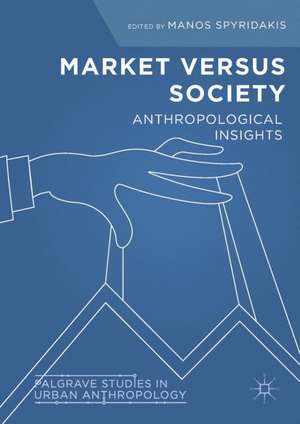Market Versus Society: Anthropological Insights: Palgrave Studies in Urban Anthropology
Editat de Manos Spyridakisen Limba Engleză Hardback – 19 mar 2018
| Toate formatele și edițiile | Preț | Express |
|---|---|---|
| Paperback (1) | 640.06 lei 22-36 zile | |
| Springer International Publishing – 14 dec 2018 | 640.06 lei 22-36 zile | |
| Hardback (1) | 645.60 lei 43-57 zile | |
| Springer International Publishing – 19 mar 2018 | 645.60 lei 43-57 zile |
Din seria Palgrave Studies in Urban Anthropology
-
 Preț: 545.88 lei
Preț: 545.88 lei -
 Preț: 390.63 lei
Preț: 390.63 lei -
 Preț: 386.81 lei
Preț: 386.81 lei -
 Preț: 190.31 lei
Preț: 190.31 lei - 15%
 Preț: 643.00 lei
Preț: 643.00 lei - 15%
 Preț: 584.26 lei
Preț: 584.26 lei - 15%
 Preț: 641.71 lei
Preț: 641.71 lei - 18%
 Preț: 737.43 lei
Preț: 737.43 lei -
 Preț: 393.90 lei
Preț: 393.90 lei -
 Preț: 390.25 lei
Preț: 390.25 lei -
 Preț: 386.39 lei
Preț: 386.39 lei - 18%
 Preț: 781.00 lei
Preț: 781.00 lei - 15%
 Preț: 640.24 lei
Preț: 640.24 lei - 18%
 Preț: 781.62 lei
Preț: 781.62 lei - 18%
 Preț: 729.06 lei
Preț: 729.06 lei - 15%
 Preț: 582.45 lei
Preț: 582.45 lei - 18%
 Preț: 779.08 lei
Preț: 779.08 lei - 18%
 Preț: 894.34 lei
Preț: 894.34 lei - 18%
 Preț: 781.94 lei
Preț: 781.94 lei -
 Preț: 387.58 lei
Preț: 387.58 lei
Preț: 645.60 lei
Preț vechi: 759.54 lei
-15% Nou
Puncte Express: 968
Preț estimativ în valută:
123.54€ • 129.31$ • 102.82£
123.54€ • 129.31$ • 102.82£
Carte tipărită la comandă
Livrare economică 31 martie-14 aprilie
Preluare comenzi: 021 569.72.76
Specificații
ISBN-13: 9783319741888
ISBN-10: 3319741888
Pagini: 330
Ilustrații: IX, 333 p.
Dimensiuni: 148 x 210 mm
Greutate: 0.56 kg
Ediția:1st ed. 2018
Editura: Springer International Publishing
Colecția Palgrave Macmillan
Seria Palgrave Studies in Urban Anthropology
Locul publicării:Cham, Switzerland
ISBN-10: 3319741888
Pagini: 330
Ilustrații: IX, 333 p.
Dimensiuni: 148 x 210 mm
Greutate: 0.56 kg
Ediția:1st ed. 2018
Editura: Springer International Publishing
Colecția Palgrave Macmillan
Seria Palgrave Studies in Urban Anthropology
Locul publicării:Cham, Switzerland
Cuprins
1. Introduction.- 2. Economy and Society: Neoliberal Reform and Economic Deviance.- 3. The Root of All Evil. Money, Markets, and the Prospects of Rewriting the Rules of the Game.- 4. Managing Against the Odds. Economic Crisis, Bad Governance and Grassroots Entrepreneurialism in Naples.- 5. From Nationalization to Neoliberalism. Territorial Development and City Marketing in Brindisi.- 6. Relations with the Market. On Cosmologies of Capitalism in Greece.- 7. ‘We are all socialists’. Greek Crisis and Precarization.- 8. ‘De proletarios a propietarios…’. Neoliberal Hegemony, Labor Commodification and Family Relationships in a ‘Petty’ Steel Workers’ Firm.- 9. At the Periphery of Development. Scenarios and Actors of an Industrial Settlement Experiment and its Crisis in the Case of FIAT-SATA in Melfi.- 10. Workers' Committees in Israel in the Heyday of Neoliberalism. From Consent to Professionalization to Alternative Solutions.- 11. Sport, the Market and Society. Contrasting the Rhetoricand Reality of Sport as a Growth Catalyst.- 12. Autonomy and Adaptivity. Farmer’s Work in France.- 13. Economic Rationality and Human Experience. Global Agrifood Chains from the Perspective of Social Anthropology.- 14. Neoliberal Agrarian Policies and its Effects. Labor Flexibility and Regimentation in Mexico’s Export Agricultural Industry.- 15. The Renegotiation of Identity and Alterity in an Economically and Spatially Changing Context. The Case of a Former Industrial and Mining District of Saint-Etienne (France).- 16. ‘Weak Heritage’ and Neighbourhood in Contemporary Cities. Capitalism and Memories of Urban Utopias.- 17. Anthropology in a Neoliberal World.
Notă biografică
Manos Spyridakis is Associate Professor of Social Anthropology at the University of the Peloponnese, Greece.
Textul de pe ultima copertă
This volume addresses the fraught relationship between market and society in times of social and economic crisis, exploring how they interact in key social, cultural, and political arenas on a global scale. The contributors examine the neoliberal market in anthropological and ethnographic terms to question whether “market logic” has won out against social aspects of human existence in a framework of minimal state protection and the devaluation of human labor. Fruitfully combining empirical data and theoretical approaches, the volume investigates the extent to which ordinary people accept unequal allocations of resources and examines their sense of belonging in an expansive neoliberal economy.
Caracteristici
Deepens and challenges the idea that economy is the sum total of rational players Brings to the forefront in anthropological terms that authority is objectively losing power Questions both the legitimacy of power structures and they way those involved in these processes use and conceive them
